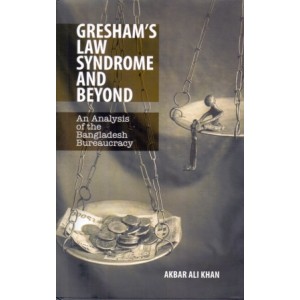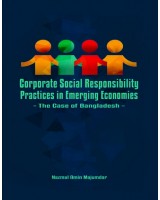Shopping Cart
0 item(s) - U$0.00- Agriculture +
- Anthropology
- Archaeology
- Arts & Photography +
- Bangladesh Studies
- Biographies & Memoirs +
- Business, Economics & Investing +
- Children's Books
- Development Studies
- Education & Reference +
- History +
- Home, Garden & Hobbies +
- Journals & Reports
- Law +
- Literature & Fiction +
- Population and Housing Census
- Reference Book +
- Religion & Spirituality +
- Sciences & Technology +
- Social Sciences +
- Travel +
- Women's Studies
- Statistics
Gresham's Law Syndrome and Beyond
Authors: Akbar Ali Khan (Author)
Edition: 1st edition
ISBN: 9789845062220
Page: 357
Format: Hardcover
Language: English
Publication Date: April 1, 2015
Product Code: 9005089
Availability: In Stock
Condition: New Book, Never used
Qty:
Bangladesh has witnessed a continuous regress in governance since her birth in 1971. The flouting of most norms of personnel administration has created Gresham’s Law Syndrome where the bad drives out the good. All the apparatuses of modem bureaucracy in the Bangladesh administration are isomorphic mimicries which look like modern institutions on paper but prove to be ineffective. This monograph is an attempt to trace the roots and consequences of the administrative maladies. It also explores the solutions of mutually reinforcing problems. The book has several unique features. First, it analyzes the administrative problems in Bangladesh in historical perspective. Secondly, the problems were analyzed in comparative perspective. Thirdly, attempts are made to evaluate the effects of measures taken after independence on the basis of quantitative evidence. This is a candid analysis of complexities and weaknesses of bureaucracy in Bangladesh, written by a former Cabinet Secretary who has spent the best part of his life in bureaucracy. Gresham ‘s Law Syndrome and Beyond offers a number of unconventional remedies for governance problems in Bangladesh. Hopefully, the recommendations of this book will stimulate debates among both practitioners and theoreticians of governance in Bangladesh.
Contents:
1. Prolegomena / 2. Historical Roots of Civil Service in Bangladesh / 3. The Structure of Civil Services in Bangladesh / 4. Departures from Merit : The Most Complex Quota System in the World / 5. Recruitment and Training: The Myths and Reality / 6. The Challenges of Discriminating the Good from the Bad: Appraising Government Executive in Bangladesh / 7. Compensation in Bangladesh Civil Service the Imperative for a New Paradigm / 8. The Vicious Circle of Politicization / 9. Strategies for Reforms / 10. Beyond Gresham’s Law Syndrome
Write a review
Your Name:Your Review: Note: HTML is not translated!
Rating: Bad Good
Enter the code in the box below:
Do you have any questions about Gresham's Law Syndrome and Beyond?
 Your Name:
Your Name: Your Email:
Your Email: Your Question:
Your Question:
Enter the code in the box below:


 (
(
